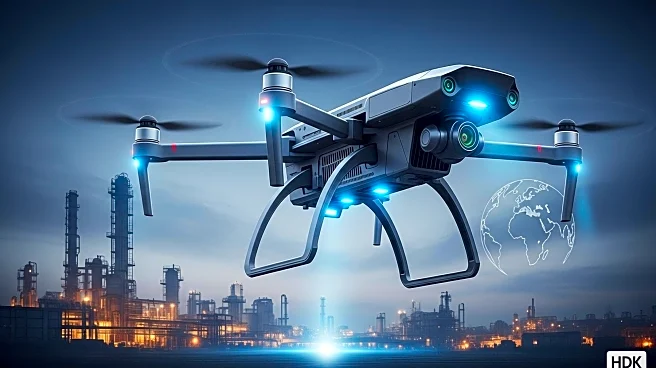What's Happening?
JPMorgan Chase has unveiled plans to invest up to $10 billion in U.S. companies deemed critical to national security. This initiative is part of a broader $1.5 trillion Security and Resiliency Initiative aimed at bolstering domestic supply chains and reducing reliance on China. The announcement comes amid ongoing trade tensions between the U.S. and China, with President Trump recently threatening new tariffs in response to China's export controls on rare earths and metals. JPMorgan CEO Jamie Dimon emphasized the need for the U.S. to rebuild industrial capacity in sectors vital to the economy and military, including defense, energy, and advanced manufacturing. The bank's investments will focus on supply chains, defense and aerospace, energy independence, and strategic technologies.
Why It's Important?
This investment by JPMorgan Chase is significant as it aligns with the Trump administration's 'America First' strategy, which seeks to reclaim domestic control over critical minerals and reduce dependency on foreign sources. The initiative aims to strengthen U.S. industrial capacity, which is crucial for national security and economic resilience. By investing in sectors like semiconductors, batteries, and defense materials, JPMorgan is addressing vulnerabilities in the supply chain that have been exposed by China's export restrictions. This move could potentially lead to increased domestic production and innovation, benefiting U.S. industries and enhancing national security.
What's Next?
JPMorgan's investment strategy is expected to unfold over the next decade, with the bank already committing about $1 trillion toward critical industries. The initiative will likely attract attention from Wall Street and policymakers, as it aligns with public policy priorities and addresses national security challenges. The Trump administration may continue to push for policies that support domestic resource independence, including fast-tracking mining permits and launching a National Critical Minerals Strategy. The bank's focus on U.S.-based ventures could lead to partnerships with companies involved in high-priority goods production, further strengthening the domestic economy.
Beyond the Headlines
The ethical and strategic dimensions of JPMorgan's initiative highlight the growing importance of resource independence in the context of global trade dynamics. As China continues to exert control over critical minerals, the U.S. faces challenges in maintaining military readiness and economic stability. JPMorgan's patriotic framing of its mission underscores the intersection of business and national security, prompting other financial institutions to consider similar investments. This development may also influence public discourse on the role of private sector investments in addressing national security concerns.










